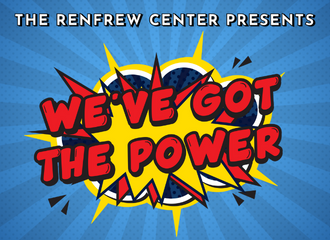Written by: Erin Birely, LCPC, Alumni Services Coordinator, The Renfrew Center & Team Leader, The Renfrew Center of Baltimore
The Renfrew Center’s theme for Eating Disorders Awareness Week is We’ve Got The Power. It’s a call to action to wholeheartedly reject the messages which tell you are not enough. When presented with this theme I started thinking about what power really means.
Websters Dictionary defines power in a lot of different ways, as we use the word to describe so many experiences and things in life. While reading through the variety of definitions, two stood out to me:
- “ability to act or produce an effect”
- “to give impetus to”
The idea that power means an ability to act, means it is something that we all have within us. So often when I think of power or hear discussions around it, they are focused on who has power and who doesn’t. But what strikes me is this idea that we inherently have power when we simply have the ability to act. With every decision we make and action we take we are asserting our individual power in the world. This, to me, is a tremendous realization.
Understanding How Much Power You Have
At times I feel powerless when I’m out in the world and notice just how all-consuming and inundated our world is with diet culture and anti-fat biases. It seems like the power is completely in the hands of the corporations and countless influencers promoting their products. When I think about power as my ability to act, I realize that I have much more power over the culture I create for myself and the people I surround myself with. I realize I can make changes within my own world at least by rejecting and speaking out against diet culture influences and fat phobia.
Simple acts like not buying diet products at the store, calling out fat phobic comments, reporting misinformation around food and weight on social media, can all reduce harm in my world and culture. And it got me thinking about what those small changes could give impetus to in the larger culture. When I take action and make changes in my own spaces, it will most likely spread. If I help educate one friend, they will hopefully educate someone else. So today I wanted to highlight a few ways we could each recognize our power and begin acting in a way that could produce significant change in our larger society.
5 Ways to Use Your Power for Good
1. Talk with family & friends
We can always start small with our own social circles. Talk with family and friends, and the people you surround yourself with, about the harmful impacts of diet culture. Educate them about fat phobia and how most people in our culture have some level of internalized bias. Make the discussion not one of shame and punishment, but openness and authenticity. Consider sharing the work you’ve done to have a better relationship with food and your body. When diet or weight talk pops up, change the subject and provide examples of all the topics there are to discuss other than weight and appearance. Remind them that there is so much more to each of us than our bodies!
2. Write a letter
There are many companies that promote diet culture and/or fat phobia, such as a food company making diet products, a clothing company refusing to use higher weight models, or even government agencies or officials promoting bills and policies. Write a letter about a topic you feel passionate about and express your beliefs and views. Include ways they could correct their actions or reduce harm. Encourage others around you with similar ideas and beliefs to do the same.
3. Advocate & educate your doctors
An important thing to remember is that many medical professionals do not receive sufficient education or training in either nutrition or eating disorders. When you go to your doctor’s office you can ask not to be weighed, or request that weight loss is not prescribed as an intervention to address a health concern. If you have access to educational materials from your dietitian or therapist, bring those with you, or ask if members of your treatment team would be willing to speak to your doctor prior to your visit. Remember that while your doctor has the medical knowledge, you are the expert on your body.
4. Recognize your internal biases
Knowing what biases we’ve internalized is important as well. Talk in therapy about your own views on weight, health, and appearance. Examine the content you’re consuming and the people in your awareness. Is your world well-rounded and does it include all types of people? Work to increase the differences in your immediate surroundings and see how much more life and connection it can provide.
5. Stop giving money to what doesn’t align with your values
We’re often going about our day and not necessarily thinking about the companies or people we’re giving money to. Take an inventory of the places you’re spending money, stores you shop, products you buy, influencers you follow, and identify what values and ideas they are supporting. Try to take the time to think about whether these values line up with yours. If not, is there another feasible option?
Conclusion
With these small steps we can each harness our own power to make changes that could have ripple effects for countless other people. The more we recognize opportunities to use our power and purposefully act in ways that support the world we want to live in, the more likely it is that world will become a reality. So, what ways will you be using your power?



